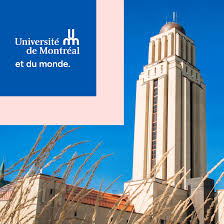 Future of Electoral Democracy Conference, University of Montreal
Future of Electoral Democracy Conference, University of Montreal
Date: 29-30.11.2024
M. Belén Abdala participated in a two-day conference organized by the University of Montreal, Chair of Electoral Democracy, where she presented her working paper "Why Do People Run for Office? Political Motivations of First-Time Candidates” co-authored with Carolina Plescia.
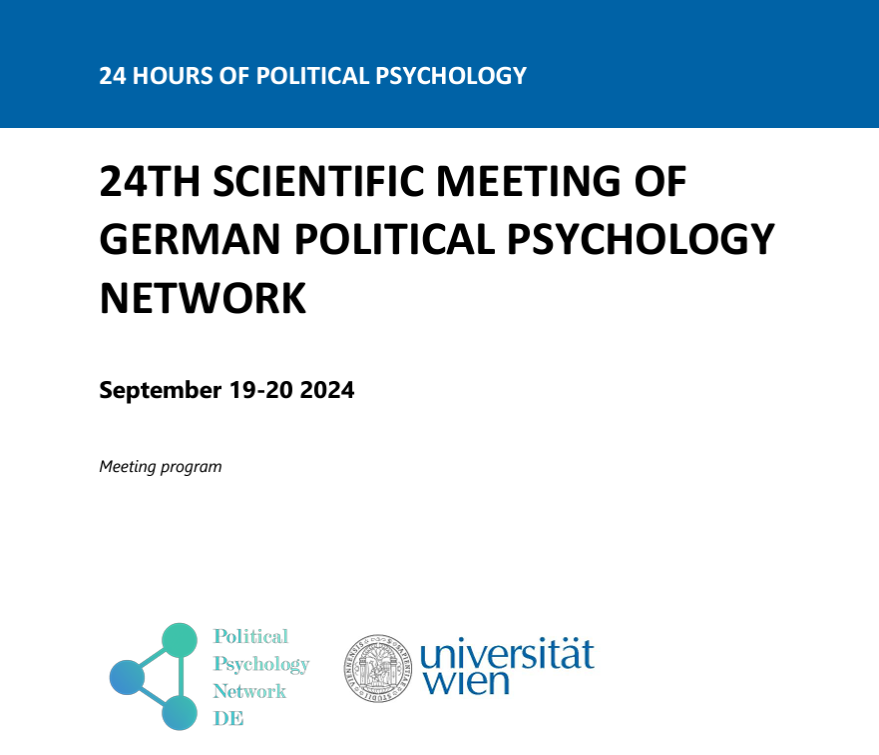 24 Hours of Political Psychology Conference 2024
24 Hours of Political Psychology Conference 2024
Date: 19-20.09.2024
The 5th Annual Meeting of the German Political Psychology Network was organised by a group of researchers from the University of Vienna, including both political scientists and psychologists, and took place on September 19-20, 2024. Anna Lia Brunetti presented the working paper "What justifies voting for underperforming authoritarian leaders?", co-authored with Carolina Plescia and Sylvia Kritzinger.
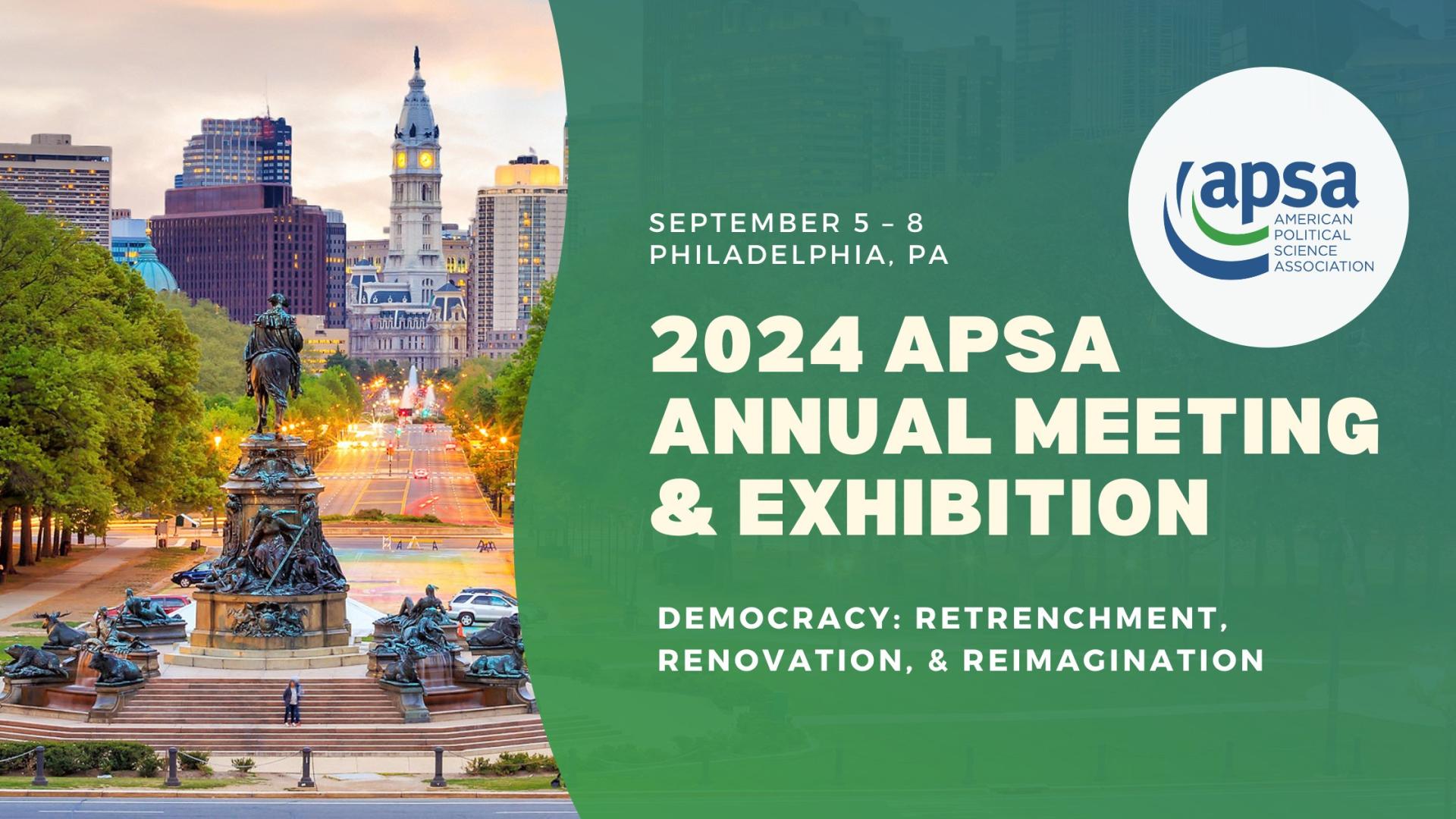 APSA 2024 Annual Meeting & Exhibition
APSA 2024 Annual Meeting & Exhibition
Date: 05-08.09.2024
The 120th APSA Annual Meeting & Exhibition on Democracy: Retrenchment, Renovation, & Reimagination, took place on September 5 – 8, in Philadelphia, USA. There, M. Belén Abdala presented two working papers: “Why Do People Run for Office? Political Motivations of First-Time Candidates” co-authored with Carolina Plescia, and a single-authored paper on “Why Do Minorities Vote? Status, Strife and Political Motivations”.
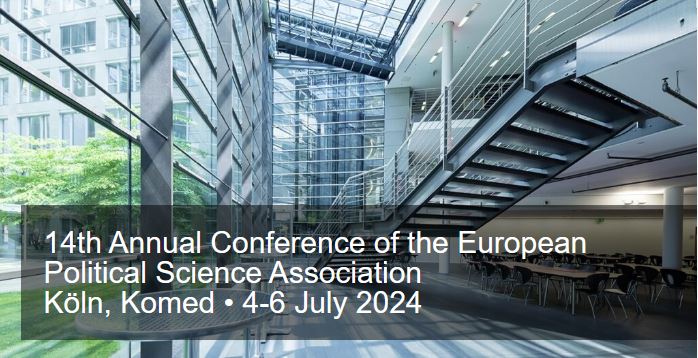 EPSA General Conference 2024
EPSA General Conference 2024
Date: 04-06.07. 2024
The 14th annual conference of the European Political Science Association took place on July 4-6, 2024, in Cologne, Germany. Anna Lia Brunetti presented the working paper "What justifies voting for underperforming authoritarian leaders?", co-authored with Carolina Plescia and Sylvia Kritzinger.
M. Belén Abdala presented the working paper “In or out? A study on how parties decide whom to include as candidates and whom to exclude” co-authored with Carolina Plescia.
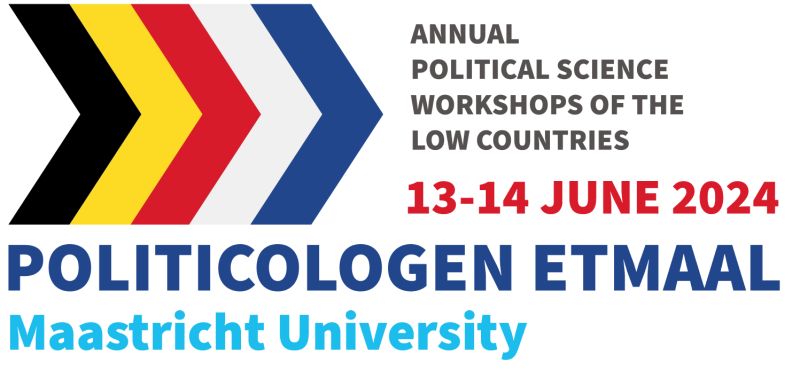 The Politicologenetmaal (24 hours of Political Science)
The Politicologenetmaal (24 hours of Political Science)
Date: 14.06.2024
This is the local conference on political science of The Netherlands and Flanders. Scholars and experts from the Low Countries meet here to exchange feedback and learn about the state-of-the-art in their field. As part of the "Contentious Cleavages" Workshop, Ming Boyer presented the paper "Voting Against or Against Voting: A Comparative Analysis of Negativity in Citizens' Meanings of Voting", co-authored by Carolina Plescia, at the Politicologenetmaal in Maastricht, The Netherlands on 14 June 2024.
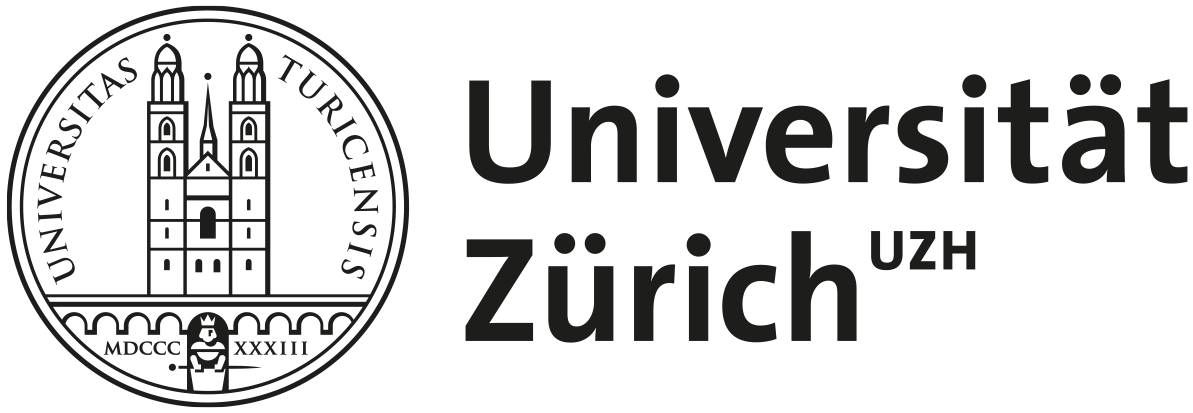 Research Stay at the University of Zurich
Research Stay at the University of Zurich
Date: 03-31.05.2024
M. Belén Abdala did a research stay at the University of Zurich, hosted by Prof. Fabrizio Gilardi, where she worked on the use of large language models and AI in social science research. The stay was supported by the KWA award (supporting short-term grants abroad at the University of Vienna).
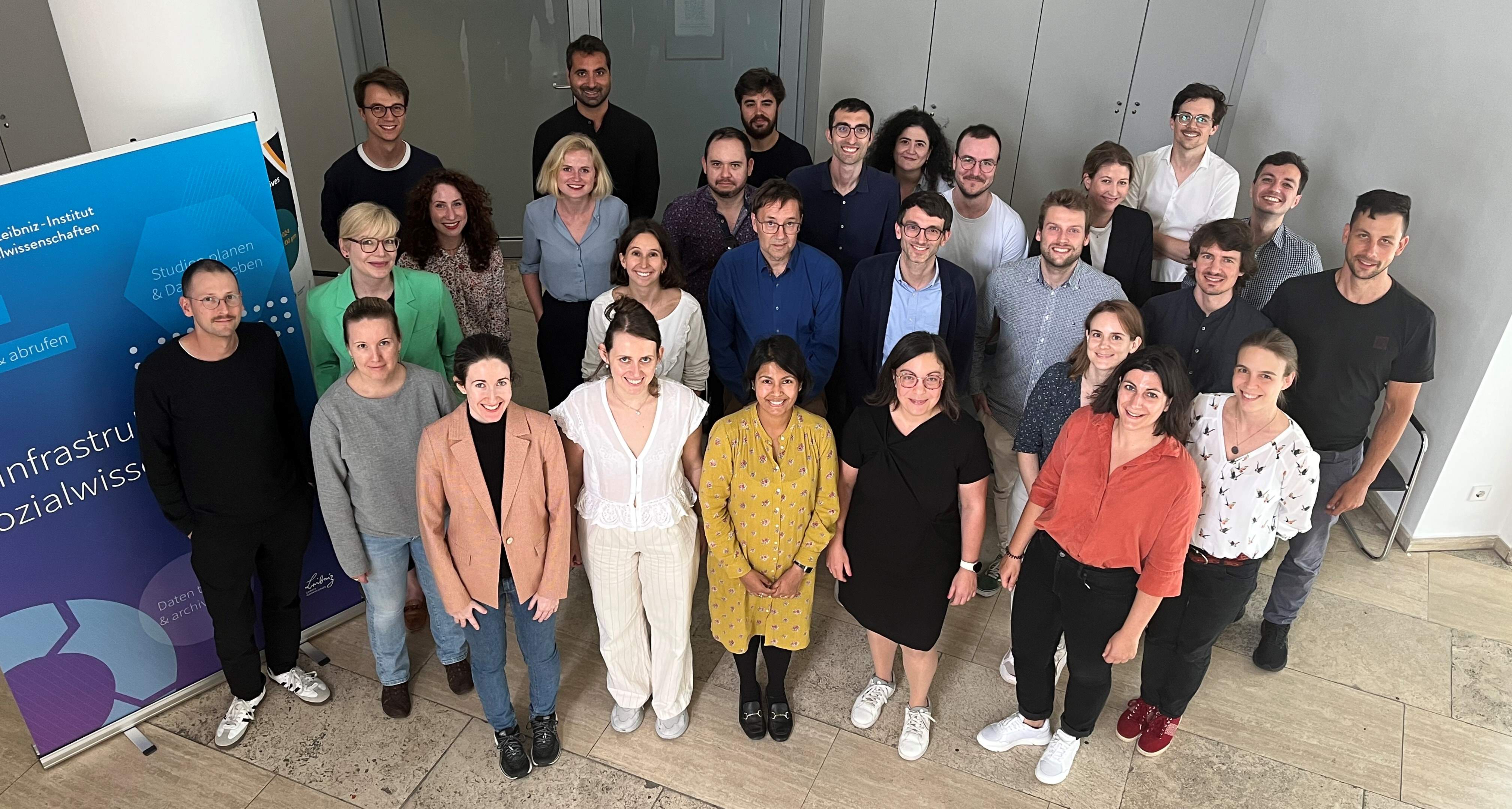 “Multi-Data Perspectives on Democracy” Workshop
“Multi-Data Perspectives on Democracy” Workshop
Date: 03.04.2024
The workshop was organised by GESIS - Leibniz Institute for the Social Science and took place on July 3, 2024, in Cologne, Germany. Anna Lia Brunetti presented the working paper "What justifies voting for underperforming authoritarian leaders?", co-authored with Carolina Plescia and Sylvia Kritzinger.
 Blondel Lecture Series
Blondel Lecture Series
Date: 16.11.2023
Assoc. Prof. Carolina Plescia delivered the inaugural Jean Blondel Lecture at the University of Essex. Her lecture was held on 'The meanings of 'voting' for ordinary citizens. The event has been launched by ECPR and the University of Essex to honour the legacy of Jean Blondel, who founded the Department of Government at the University of Essex and was one of the founders of ECPR.
 DeVOTE Book workshop
DeVOTE Book workshop
Date: 19-20.10.2023
In preparation for publishing their forthcoming book project, the DeVOTE research team held a two-day book workshop at the University of Vienna on October 19-20, 2023. The workshop was attended by the members of the international Advisory Board of the project as well as a group of experts on electoral behaviour and democratic theory namely Jennifer Oser (Associate Professor at Ben-Gurion University), Filip Kostelka (Chair and Professor at the European University Institute), Kaat Smets (Associate Professor of Politics at Royal Holloway, University of London), Enrique Hernandez Perez (Associate Professor at the Universitat Autònoma de Barcelona), Julia Partheymüller (Senior Scientist at the University of Vienna) and Petro Tolochko (Postdoc researcher at the University of Vienna).
 WAPOR 76th Annual Conference
WAPOR 76th Annual Conference
Date: September 19-22, 2023
WAPOR Annual Conference brings together academic, commercial and government researchers from around the world to learn and discuss about the latest polling trends, techniques and approaches. Anna Lia Brunetti presented the single-authored working paper on “Voting Meanings and Political Participation”. María Belén Abdala presented the working paper on “I-voting in Estonia: Disentangling the effects of trust in government and e-voting systems”.
 ECPR General Conference 2023
ECPR General Conference 2023
Date: September 04-08, 2023
The General Conference is a prestigious global stage that promotes innovative thinking, facilitates rich discussions and nurtures the development of research across all sub-disciplines of political science. Anna Lia Brunetti presented the single-authored working paper on “Voting Meanings and Political Participation”. María Belén Abdala presented the working paper on “I-voting in Estonia: Disentangling the effects of trust in government and e-voting systems”, co-authored with Carolina Plescia, Ming M. Boyer and Anna Lia Brunetti. Ming M. Boyer presented two working papers at ECPR. First, he presented the paper “Outgroup Vote Delegitimization: Social-Political Perceptions of Outgroup Votes and Affective Polarization”, co-authored with Carolina Plescia and María Belén Abdala. Second, he presented the single-authored working paper “Strategic Game Frames and the Cynicism Paradox: The Framing of Elections and Citizen Meanings of Voting”. For their contribution in 2022 (“Negative campaign, negative votes? How Political Campaigns Impact Citizens’ Meanings of Voting”), Ming Boyer, Cal le Gall and Carolina Plescia received the Best Paper Award of the Political Communication Standing Group at the ECPR.
 EPSA 2023
EPSA 2023
Date: June 22-24, 2023
The conference consists of a mix of world-leading political science research, engagement through professional events, roundtables, and networking functions, and an outstanding social programme. There, María Belén Abdala presented a paper on affective polarization titled “Vital Victories and Disastrous Defeats: Affective Polarization, Meanings of Voting and Acceptance of Election Results” co-authored with Carolina Plescia and Ming M. Boyer. Cal Le Gall presented a paper on electoral turnout titled “Globalization, meanings of voting and turnout: experimental evidence from the US” co-authored with María Belén Abdala, Ming M. Boyer and Carolina Plescia.
 73rd Annual ICA Conferene
73rd Annual ICA Conferene
Date: May 25-29, 2023
The conference consists of world-leading communication science research, of which the political communication and mass communication sections were of particular importance to DeVote. There, Ming Boyer presented a working paper called “Negative campaign, negative votes? Political Campaigns and Citizens’ Meanings of Voting in Hungary and the US”, co-authored with Cal le Gall and Carolina Plescia, as well as the single-authored working paper “Strategic Game Frames and the Cynicism Paradox: The Framing of Elections and Citizen Meanings of Voting”.
 80th Annual Midwest Political Science Association Conference
80th Annual Midwest Political Science Association Conference
Date: April 13-16, 2023
The Conference of the Midwest Political Science Association took place on 13th-16th April in Chicago, Illinois. Two team members attended on behalf of the DeVOTE Project: María Belén Abdala presented the working papers "How would you like to vote?" and "Vital Victories and Disastrous Defeats: Outgroup Vote Delegitimization, Affective Polarization and Acceptance of Election Results", and Anna Lia Brunetti discussed the working papers "Election integrity, electoral participation and the meanings of voting" and "Voting meanings and Political participation".
 The Electoral Psychology Observatory (EPO) - London
The Electoral Psychology Observatory (EPO) - London
Date: February 02, 2023
The Electoral Psychology Observatory (EPO) led by Prof. Michael Bruter and Prof. Sarah Harrison invited the DeVOTE project (Cal Le Gall) for a discussion of their ERC project on the occasion of its 3rd anniversary. The event took place in the Houses of Parliament of the United Kingdom and Cal Le Gall discussed the findings of EPO on the state of electoral hostility and its key symptoms in major democracies including the US, UK, France, Australia, South Africa, Sweden, and South Korea.
 What we (Don't) Know About Voting and Why it Matters: Citizen Meanings of Voting
What we (Don't) Know About Voting and Why it Matters: Citizen Meanings of Voting
Date: December 9, 2022
Ming Manuel Boyer presented at the Dutch Political Psychology Meeting, hosted by the Amsterdam School of Communication Research at the University of Amsterdam their working paper with Carolina Plescia, Cal Le Gall, Maria B. Abdala and Anna Lia Brunetti.
 Meanings of voting: What we (don't) know about voting and why it matters
Meanings of voting: What we (don't) know about voting and why it matters
Date: December 2, 2022
The Governance research team at Pacte laboratory invited Cal Le Gall for a presentation during their weekly seminar. Cal Le Gall presented two working papers at this occasion: “The emergence and content of citizens’ meanings of voting: An analysis of focus groups and individual interviews” co-authored with Carolina Plescia and Maria B. Abdala, and "What we (don't) know about voting and why it matters" with Carolina Plescia, Maria B. Abdala, Anna Lia Brunetti and Ming Boyer.

In It to Win It? The Role of Citizen Meanings of Voting in the Winner Loser Gap of Diffuse Political Support
Date: December 1, 2022
Carolina Plescia presented their working paper with Ming M. Boyer and Anna Lia Brunetti ‘In It to Win It? The Role of Citizen Meanings of Voting in the Winner Loser Gap of Diffuse Political Support‘ at the Ciència Política of the University of Barcelona.
 9th European Communication Conference
9th European Communication Conference
Date: October 19-22, 2022
For the ECREA 2022 conference in Aarhus, the theme “Rethink Impact” is suggested as a frame for discussing how research, academic education, and training interact with, impact on and reflect society. Ming Boyer presents the working paper “Negative campaigns, negative votes? How negative and dirty campaigning impacts citizens' meanings of voting”.
 2022 APSA Annual Meeting & Exhibition
2022 APSA Annual Meeting & Exhibition
Date: September 15-18, 2022
The 2022 conference theme is “Rethink, Restructure, and Reconnect: Towards A Post-Pandemic Political Science.” Ming Boyer presents the working paper “A Social Identity Perspective on Negative Campaigning: Effects of Positive, Negative and “Dirty” Campaigning by Ingroup and Outgroup Parties” at the APSA Pre-Conference in Political Communication. Anna Lia Brunetti presents the working paper “Political Support and Citizen Meanings of Voting”.
ECPR General Conference
Date: August 22-26, 2022
The General Conference is a prestigious global stage that promotes innovative thinking, facilitates rich discussions and nurtures the development of research across all sub-disciplines of political science. Ming Boyer presents the working paper on “Negative campaigns, negative votes? How perceptions of political campaigns impact citizens’ meanings of voting”.
 The 45th Annual Scientific Meeting of the International Society of Political Psychology (ISPP)
The 45th Annual Scientific Meeting of the International Society of Political Psychology (ISPP)
Date: July 14-17, 2022
The conference theme is “Democracy as an Achievement: Recognizing Tensions, Challenges, and Aspirations through Political Psychology.” Cal Le Gall presents the working paper on “The emergence and content of citizens’ meanings of voting: An analysis of focus groups and individual interviews”.
 Challenges of Electoral Integrity Around the Globe – Virtual Conference of EIP
Challenges of Electoral Integrity Around the Globe – Virtual Conference of EIP
Date: July 4-8, 2022
This workshop brings together academics and practitioners to discuss current challenges of electoral integrity around the globe. María Belén Abdala presents the working paper on “Election integrity and the meanings of voting”.
 Will the Orbán Regime Survive or Fall? Roundtable on the 2022 Hungarian Elections
Will the Orbán Regime Survive or Fall? Roundtable on the 2022 Hungarian Elections
Date: March 29, 2022
Invited experts discuss the chance of survival or fall of Orbán's competitive authoritarian regime. Carolina Plescia showcases the project’s aim, and fresh evidence on data collected in Hungary.


